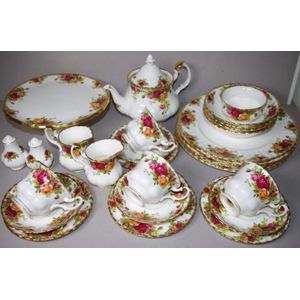Royal Albert 'Old Country Roses' Dinner Set for 12
You must be a subscriber, and be logged in to view price and dealer details.
Subscribe Now to view actual auction price for this item
When you subscribe, you have the option of setting the currency in which to display prices to $Au, $US, $NZ or Stg.
- Gilding - Gilding is a method of ornamentation whereby a thin sheet of gold metal is applied to items made of wood, leather, ceramics, glass and silver for decorative purposes.
For furniture including mirrors, the sheet of gold is usually applied over a coating of gesso. Gesso is a mixture of plaster of Paris and gypsum mixed with water and then applied to the carved wooden frames of mirrors and picture frames as a base for applying the gold leaf. After numerous coats of gesso have been applied, allowed to dry and then sanded a coat of "bole", a usually red coloured mixture of clay and glue is brushed on and allowed to dry, after which the gold leaf is applied. Over time parts of the gilding will rub off so the base colour can be seen. In water gilding, this was generally a blue colour, while in oil gilding, the under layer was often yellow. In Victorian times, gilders frequently used red as a pigment beneath the gold leaf.
Metal was often gilded by a process known as fire gilding. Gold mixed with mercury was applied and heated, causing the mercury to evaporate, the long-term effect of which was to kill or disable the craftsman or woman from mercury poisoning. The pursuit of beauty has claimed many victims, not the least of which were the artists who made those pieces so highly sought after today.
This item has been included into following indexes:
Visually similar items

Royal Albert 'Old Country Roses' dinner setting for six persons comprising seven main plates, six side plates, six cup saucer plate sets, six double handled soup bowl & saucer sets, six dessert bowls, sugar bowl & cream jug with tray, double handled cake t

Part Royal Crown Derby coffee service, 'Royal Antoinette' pattern, to include coffee pot, hot water jug, 7 coffee cans and 8 saucers, a cake plate and jug

Royal Albert 'Old Country Roses' dinner set, comprising 4 dinner plates, 4 dessert bowls, 4 trios, cake stand, tea pot, creamers (2), sugar bowl & salt & pepper shakers (shakers have no factory markings)

Rosenthal 'San Souci' dinner setting
